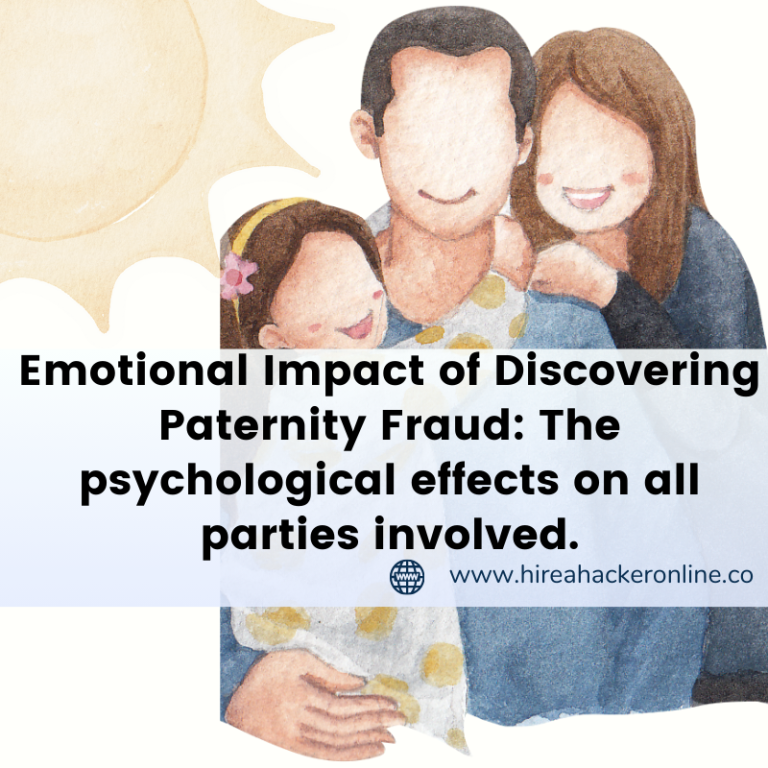Paternity fraud happens when someone lies about a child’s biological father. This act can lead to significant emotional distress for everyone concerned. When the truth comes out, feelings of betrayal and confusion often arise. Understanding the psychological effects is important. This article discusses how paternity fraud affects parents and children.
Understanding Paternity Fraud
Paternity fraud can happen in different ways. A mother might wrongly name a father. Or, of course, DNA samples might be exchanged. These actions can have serious consequences. The psychological effect can be profound, affecting relationships and trust.
When the truth is revealed, it can change family relations forever. Each person involved faces unique emotional challenges. Recognizing these difficulties can help in the healing process.
The Impact on the Biological Father
It can be shocking for the actual father to find out about paternity fraud. He might be angry, hurt, and confused. Realizing that he was lied to can make him feel like he is not good enough. He might wonder what his job is and what he’s worth as a dad.
Feelings of Betrayal
When a father learns he is not the biological parent, betrayal is common. He may feel hurt by the person he trusted. This sense of betrayal can lead to anger and resentment. Such feelings can strain relationships and affect mental health.
Identity Crisis
Knowing that you were lied to can lead to an identity problem. A father might think about the choices he has made in the past. He might wonder what he knows about being a dad and family. This kind of misunderstanding can make people depressed and anxious.
The Impact on the Mother
The mother involved in paternity fraud also faces emotional turmoil. She may experience guilt and shame. These feelings can be overwhelming, especially if she has lied to the father and the child.
Guilt and Shame
Mothers often feel guilty for deceiving the biological father. They might regret their actions and worry about the consequences. This guilt can lead to isolation and stress. The mother may fear losing the father’s love and support.
Anxiety About Consequences
A mother may also worry about what the law says about her actions. She might have to pay child support or fight for control. These fears can make you feel more stressed and anxious. It can be hard to deal with these feelings while keeping up with family obligations.
The Impact on the Child
Coping with the mental effects of children caught in paternity fraud is very hard. Discovering the truth about their parentage can be confusing and upsetting. They may feel betrayed by their mother and unsure about their identity.
Confusion and Identity Issues
It can be confusing for a child to find out that their real father is not who they thought he was. They might have trouble figuring out where they fit in the family. People may wonder who they are and where they fit. The problems with these identities can cause long-lasting mental problems.
Feelings of Rejection
Also, kids may feel ignored when they find out the truth. Low self-esteem can happen if they feel like their real father has left them. They might doubt their worth and have problems with feeling not good enough. These feelings can change how they interact with other people.
Coping with the Emotional Impact
It’s important for everyone involved in paternity fraud to deal with the mental effects of it. Open conversation is very important. Everyone should say how they feel about what’s happening. This openness can help people trust and understand each other again.
Seeking Professional Help
Professional help can be helpful for everyone involved. Therapy can provide a safe space to talk about feelings, and a therapist can help people figure out how to deal with their feelings and build coping techniques. Support groups may also offer comfort and a way to connect with others who are going through similar things.
Rebuilding Trust
It takes time to rebuild trust after paternity scam. Talking about thoughts in an open way can help. To give their child a safe home life, both parents must work together. Working together can help people get along and understand each other better.
Moving Forward
It takes time to get over the mental effects of paternity fraud. Everyone needs to be patient and put in some work. It’s important to accept what’s really going on. This understanding makes it possible for people to heal and grow.
Forgiveness
Forgiveness plays a vital role in the healing process. Forgiving oneself and others can help release feelings of anger and resentment. It does not mean condoning the actions that led to the fraud. Instead, it allows individuals to move forward.
Building New Relationships
Establishing new relationships can also aid in healing. Creating a bond with the biological father can be beneficial. The child may need time to adjust, but positive relationships can lead to emotional growth. Supportive relationships can help all parties find peace.
Final Thought
The emotional impact of discovering paternity fraud is profound. It affects everyone involved—fathers, mothers, and children. Feelings of betrayal, guilt, and confusion can overwhelm individuals. However, with open communication and professional help, healing is possible. Recognizing the psychological effects is crucial for moving forward. In time, individuals can rebuild trust and create healthier relationships. Understanding and forgiveness can pave the way for a brighter future for all involved.
Sources:




